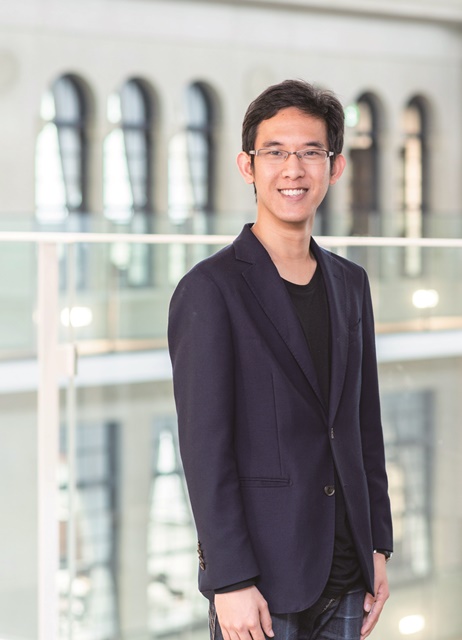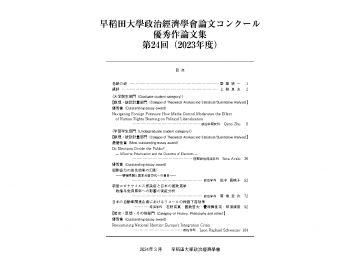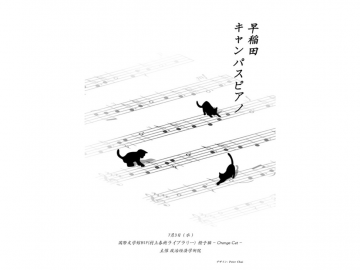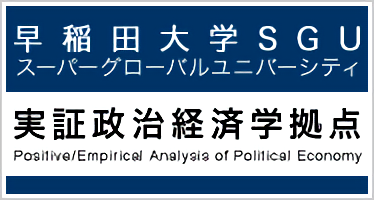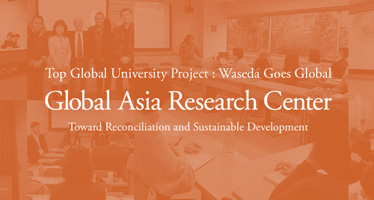“Communicating with different people pushes you to crack open your brain and explore things from different perspectives”
Kittipong CHANCIEOVICHAI
English-based Degree Program (Economics Major)
Graduate of ISE International School in Thailand
Uniqueness to learn at Waseda SPSE
One thing I found very interesting at Waseda SPSE is that we must take both the economics and political science courses. Although many schools offer economics independent of other fields of study, in which the students can get a very deep understanding of economic theories alone, at SPSE I feel that the addition of international relations and political science helps the students understand which economic theories are more viable in the real world and which are applicable only under certain conditions.
An interactive seminar that allows the students to engage through active learning
My favorite courses are the seminars, especially the one by Prof. Kohei Kawamura, because of its format—an interactive seminar that allows the students to engage through active learning. In the seminar, the other students and I are always discussing how to apply what we learned (economics and politics) to real-life situations, and analyzing potential solutions to existing problems. I am particularly amazed by the fact that Prof. Kawamura does not act like the “thought police” who tells us how to think, but like a mentor who helps us ask the right questions. For example, when we talk about the economic viability of nonprofit organizations (NPOs), we scrutinize their organizational structures, including their administrative efficiency and their financial sustainability. Instead of going with the flow and just saying, “NPOs are great, we should support them,” we question the percentage of our donated money that covers administrative costs and the percentage that reaches the intended recipients. We also discuss where the money comes from, such as who sponsors are and why they donate to the NPOs. Social recognition and tax incentives are two of the answers we keep reaching.
A more concrete example is the Fair Trade Certification. Prof. Kawamura asks such questions as, “To whom is it fair?” “How do they make money?” and “When we pay extra for Fair Trade products, how much goes to the farmers, the sellers (supermarkets, etc.), and the fair trade foundation?” The students then provide answers that will be heavily scrutinized and built upon. Finally, the professor and students discuss the issue further. With this dynamic, the seminars always go beyond our expectations. Nevertheless, the students should be prepared to take criticism while staying open-minded, since everyone is always playing devil’s advocate in this seminar.
A lot of opportunities to study with both JDP and EDP students
The environment, in which JDP (Japanese-based Degree Program) and EDP (English-based Degree Program) students study together, has facilitated an interactive exchange of ideas from both inside-out and the outside-in perspectives. While a JDP student has a deep understanding of the local political and economic situation, an EDP student brings a fresh perspective of his/her own cultural background. This encourages a smoother facilitation of the problem-solving and solution-finding processes among the students. In fact, I have made friends with a JDP student majoring in political science, and we usually hang out at a café near the Waseda campus, discussing world issues and potential solutions to help alleviate problems, one person at a time. The meetups are so effective that they eventually became routine lunch sessions in which even students outside of SPSE are joining.
I don’t think that there was a single incident that has changed my personality, but I certainly have listened to and learned a lot from perspectives from the other students. I have met all kinds of people, ranging from those who support the centralization of political power to the extent that is depicted in the book 1984, to those who believe in the “invisible hands” and survival of the fittest. I have also talked with someone who thinks that social structures are too rigid and that social chaos is a utopia we should all strive for. One of my favorite topics is whether we should pursue knowledge purely for its own sake, or for its application in the real world. In conclusion, communicating with different people not only challenges your basic assumptions about what is “normal,” but pushes you to crack open your brain and explore things from different perspectives and under a different lens.
(April 2019)

